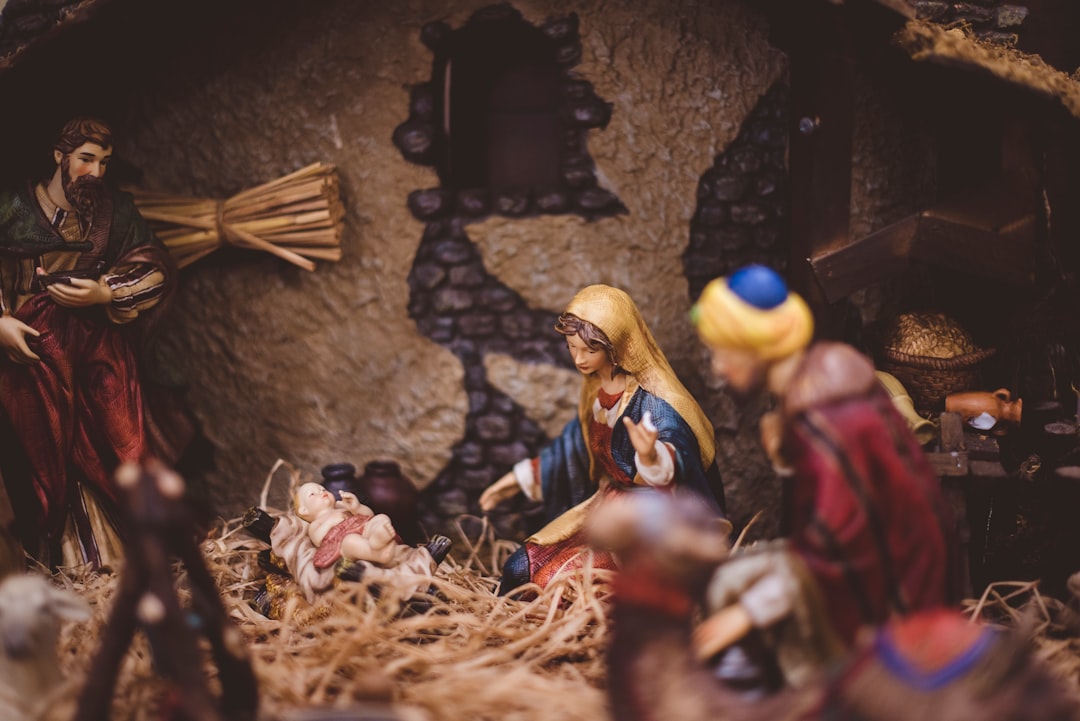Within the pages of the Bible, there are countless individuals who have played pivotal roles in shaping the course of history. One such figure is Demetrius – a name that appears only briefly in the New Testament. Who was this mysterious man, and what significance does he hold in the context of the Bible and Christian history? In this article, we will explore who Demetrius was and what can be learned from his story. Join us as we uncover the truth about this enigmatic figure.
Introduction to Demetrius in the Bible

In the vast and complex world of the Bible, there are many figures and characters to explore. One of the more mysterious individuals found within its pages is Demetrius. Who was Demetrius in the Bible? What role did he play in the early church? How has his story impacted the Christian faith?
Here are some key things to keep in mind as we delve into the story of Demetrius:
- Demetrius is mentioned briefly in several parts of the New Testament, primarily in the book of Acts.
- There were likely multiple individuals with this name at the time, so it can be difficult to determine which specific Demetrius is being referred to in each instance.
- Despite this, we can still piece together some information about Demetrius and the role he played in the early Christian church.

With those points in mind, let’s dive into the world of Demetrius as it appears in the Bible.
Some key passages that mention Demetrius include Acts 19:24-41, 3 John 1:12, and possibly even Romans 16:23. In Acts 19, we see that a man named Demetrius was a silversmith in the city of Ephesus. He made silver shrines of the goddess Artemis (also known as Diana) and sold them to people who came to worship in her temple. However, when a Christian missionary named Paul began to preach in the city, Demetrius became worried that his business would suffer. He rallied some fellow craftsmen and led a riot that nearly turned violent.
In 3 John 1:12, we see another mention of someone named Demetrius. However, scholars aren’t sure if this is the same person as the aforementioned silversmith or a different individual entirely. In Romans 16:23, Paul sends greetings to someone named “Gaius, who is host to me and to the whole church. Erastus, the city treasurer, and our brother Quartus, greet you.” Some scholars believe that Quartus may be a Latinized version of the Greek name Demetrius, but this is far from certain.
While there is still much we don’t know about Demetrius, these passages give us some clues as to who he was and what role he played in the early Christian church. In the next section, we’ll take a closer look at the historical context in which Demetrius lived.
Demetrius in the New Testament
Demetrius is not a commonly known figure in the Bible. He is only mentioned twice in the New Testament, specifically in the book of Acts and in one of the letters of the apostle John. In Acts of the Apostles, Demetrius is portrayed as a silversmith from Ephesus who creates silver models of the temple of the goddess Artemis, which were sold to the masses. However, a particular event involving the apostle Paul caused a stir among the customers.
According to Acts 19:23-28, Paul’s preaching made a significant impact on the population of Ephesus, particularly on the followers of Artemis. The intense response to Paul’s teachings led Demetrius and other silversmiths to organize a meeting, claiming that Paul was a threat to their business and religion. Demetrius addresses the assembled crowd, saying, “Men, you know that from this business, we have our wealth. And you see and hear that not only in Ephesus but in almost all of Asia this Paul has persuaded and turned away a great many people, saying that gods made with hands are not gods.” (Acts 19:25-26, ESV)
The crowd eventually becomes enraged and starts shouting, “Great is Artemis of the Ephesians!” (Acts 19:28, ESV) Paul’s disciples manage to save him from any harm, and the meeting ends without any further incident.
Demetrius is also mentioned in one of the letters of John, possibly written to a specific church community, urging the recipients to show hospitality to a group of travelling preachers, including Demetrius himself. John praises Demetrius, describing him as a man who has “received a good testimony from everyone” (3 John 12, ESV).
Although Demetrius is not a central figure to the biblical narrative, his two appearances in the New Testament offer valuable insights into the early church’s challenges and struggles. Demetrius’s reaction to Paul’s teachings highlights the conflicts between the new Christian faith and pagan religions in the Greco-Roman world. Moreover, John’s positive reference to Demetrius showcases the importance of trust and reputation within the early church community.

In conclusion, Demetrius in the New Testament serves primarily as a supporting character in the grand narrative of the early church’s history. Nevertheless, his limited appearances offer much-needed context regarding the religious and social landscape of the ancient world.
The Greek Demetrius and the Roman Empire
Demetrius, mentioned in the New Testament, is a common Greek name that was popular at the time of the Roman Empire. As such, it can be challenging to differentiate between the various individuals named Demetrius throughout history.
In the context of the Bible, the most well-known Demetrius is referenced in the book of Acts, chapter 19. This Demetrius was a silversmith in the city of Ephesus who made a living crafting silver shrines to the goddess Artemis. When Paul and his teaching gained popularity in Ephesus, Demetrius grew concerned that his business (and that of others) would suffer as more people converted to Christianity and stopped practicing pagan worship. In response, he stirred up a crowd and led a riot against Paul and his companions.
It’s worth noting that there also existed a Demetrius who was a ruler of a city in Macedonia and a disciple of the Apostle John. While some scholars argue that these may be the same person referenced in different contexts, there isn’t enough evidence to definitively prove this theory.
Outside of the Bible, there are several historical figures with the name Demetrius who may have lived during the same time period as the events in the New Testament. One of the most notable is Demetrius I Poliorcetes, a Macedonian king who was active in the late 4th century BC. However, this is too far removed from the timeline of the New Testament to be relevant to the Demetrius referenced in Acts.
In retrospect, it doesn’t ultimately matter which specific Demetrius is being referenced in the Bible. What’s more important is the context and message conveyed through this particular figure. Demetrius, the silversmith, serves as a representation of the opposition Paul and his companions faced as they spread the teachings of Christianity during a time when paganism reigned as the prominent religion in much of the ancient world.
« Unveiling the Spiritual Essence of the Vineyard Movement
Was Solomon Saved? Exploring the King’s Fate in the Bible. »
In summary, it’s challenging to differentiate between the many individuals named Demetrius throughout history. However, in the context of the New Testament, the Demetrius referenced in Acts is a representation of the opposition faced by those spreading the teachings of Christianity in a largely pagan world.
Demetrius in the Early Church and Christian History
Demetrius in the Bible was a key figure during the early days of Christianity. Records show that he was a silversmith in Ephesus who played a prominent role in opposing Paul’s teachings and his converts. His opposition towards Christianity led to the well-known incident recorded in Acts of the Apostles where he urged fellow silversmiths to riot against Paul and his followers. However, beyond these facts, there is much more to learn about Demetrius in the context of early Christianity.
In the early days of the Christian Church, there were constant clashes between the pagan world and the Christian faith. Demetrius, a Greek who was operating in a system dominated by Roman rule, was exposed to a worldview devoid of Christian values. Considering this background, some historians argue that it was impressive that he eventually converted to Christianity, although there aren’t any records that indicate this.
Regardless, Demetrius’ story in the early Church highlights the challenges that new converts faced during this intense era in Christian history. Not only were they ostracized by their communities, but they were also at risk of being persecuted and even killed for their newfound faith.

However, despite the challenges, many early converts held firm to their faith, desiring to uphold scripture and doctrine as taught by Apostles like Paul. Demetrius’ story serves as a representation of the early Church and its struggle in the face of persecution. It highlights Christian’s unwavering faith in the face of danger and suffering- values that continue to inspire Christians to this day.
In addition, the story of Demetrius and his transformation also raises questions about how people can change their beliefs and their system of thinking. It shows that individuals can move from vehement opposition to conversion to the Christian faith through personal transformation and the work of the Holy Spirit.
As an early religious figure, Demetrius’ impact on Christian history remains significant. His encounter with Apostle Paul provides a gateway to better understanding the complexities of the early-church’s efforts to establish Christianity in the Roman Empire. Therefore, his story, though brief in scripture, offers crucial insights into one of the most impactful transformations in Christian history.
In summary, Demetrius’ early days as a silversmith in Ephesus shaped his worldview and his opposition to early Christianity. Despite his differences with the new converts, his story mirrors the challenges early Christians experienced in the face of persecution. Yet, his ultimate conversion remains a testament to the transformative power of the gospel. Demetrius in the early Church stands out as an example of a man who went on a journey of faith, highlighting how critical it is for believers to remain steadfast in their faith.
Theological Implications of Demetrius in Scripture

As we delve deeper into the story of Demetrius in the Bible, it becomes clear that there are many theological implications that can be drawn from his life and teachings.
-
Conversion: Demetrius, a former pagan, converted to Christianity after hearing the teachings of the apostles, particularly Paul. This highlights the transformative power of the gospel and serves as a reminder that no one is beyond redemption.
-
Missionary work: After his conversion, Demetrius became a missionary, preaching and teaching the gospel to others. This underscores the importance of sharing the good news of salvation with others and living out our faith in tangible ways.
-
Doctrine: Demetrius is mentioned in the context of a letter from John to Gaius, in which he commends Demetrius for his faithfulness to the truth. This suggests that Demetrius had a solid understanding of doctrine and was able to effectively communicate it to others. As Christians, we are called to be grounded in our understanding of scripture and to share that understanding with others.
-
Perseverance: Demetrius faced persecution and martyrdom for his beliefs, yet he remained steadfast in his faith. This serves as an example to us that we too can persevere in the face of adversity and stand firm in our convictions.
In summary, Demetrius’ life illustrates important principles of conversion, missionary work, doctrine, and perseverance that are foundational to the Christian faith. We can learn from his example and seek to follow in his footsteps as we walk out our own faith journeys.
Demetrius in the Context of Persecution and Martyrdom
Demetrius in the Bible was a name mentioned in the New Testament as one of the disciples of the apostle John. However, there is another Demetrius mentioned in the Bible that was a pagan silversmith in Ephesus who caused a riot because of the decline in sales of silver idols due to the teachings of Paul. He is mentioned in Acts 19:24-41.
During the early church, the conversion of pagans was not always welcome, and this caused tension and persecution towards the Christians. Demetrius was a pagan silversmith who saw the decline of his business due to the teachings of Paul. In this context, the mentioning of Demetrius in the New Testament hinted at the struggles early Christians had faced, including acts of persecution and martyrdom.
The Bible tells us that the first Christian martyr was Stephen, who was stoned to death for preaching the Gospel. Other than Stephen, some of the notable martyrs in Christianity were Peter, who was crucified upside down, James, who was beheaded, and Paul who was beheaded as well. These early Christians were considered a threat to the Roman Empire since they did not worship the Roman gods and refused to acknowledge the Emperor as a god.

The context of persecution and martyrdom in Christianity is often difficult to understand, especially for those who have never experienced religious persecution themselves. However, the stories of the martyrs were meant to inspire courage and strength in the face of injustice. They were faithful to the message of Christ and were willing to die for it. This sacrifice demonstrated the strength of their faith and the hope they found in the salvation offered by Christ.
As we read about Demetrius in the context of persecution and martyrdom, we can see how conflicts and challenges often strengthen our faith. Though it’s hard to imagine the trials that early Christians faced, their stories remind us that our faith is worth holding on to, and that it is a great privilege to live in a society where we are free to worship as we choose. We can learn from Demetrius’ story to have courage in our faith and to follow God’s calling even if it means facing persecution or hardship.
Demetrius in the Bible was more than just a name; it represented a historical context in which the early Christians had to operate and a reminder of how faith can endure amidst persecution and martyrdom. His story reminds us that we should remain steadfast in our faith regardless of the challenges we face, and that we should continue to spread the Good News to those around us, even if it comes with great personal cost.
Conclusion: What We Can Learn from Demetrius in the Bible
After delving into the history and context surrounding Demetrius in the Bible, it’s important to examine what we can learn from this figure in terms of our own faith. Here are some key takeaways:
-
Keep an open mind to the power of conversion: It’s easy to dismiss someone as “unconvertible” because of their background or beliefs, but as we see in the case of Demetrius, even the staunchest pagan can have a change of heart. This serves as a reminder that we are all capable of growth and transformation through Christ.
-
Stand up for what you believe in: Demetrius showed immense passion and conviction in his beliefs, even when it meant standing up against a popular movement. As Christians, we should aim to live out our faith in the same bold way, even when it’s unpopular or uncomfortable.
-
Be mindful of the impact of our actions: When Demetrius saw that his livelihood was being threatened by Paul’s teachings, he reacted with violence and anger. This serves as a reminder to us that our actions have real-life consequences, and we should always strive to approach conflicts with grace and love.
-
Remember the power of community: Throughout Demetrius’ story, we see the power of community–whether it’s the mob that gathers in Ephesus or the group of believers who stand by Paul. This serves as a reminder that we are not meant to live out our faith alone; we need the support and encouragement of others to grow and thrive.
-
Trust in God’s plan: Ultimately, we see in Demetrius’ story that even in the midst of turmoil and persecution, God is in control. As Christians, we can take comfort in the fact that our lives–and the world at large–are part of a much larger and divine plan.
Overall, Demetrius serves as a fascinating and complex figure in the history of Christianity, reminding us of both the challenges and rewards of following Christ. By examining his story and reflecting on its lessons, we can deepen our own faith and understanding of God’s plan.












